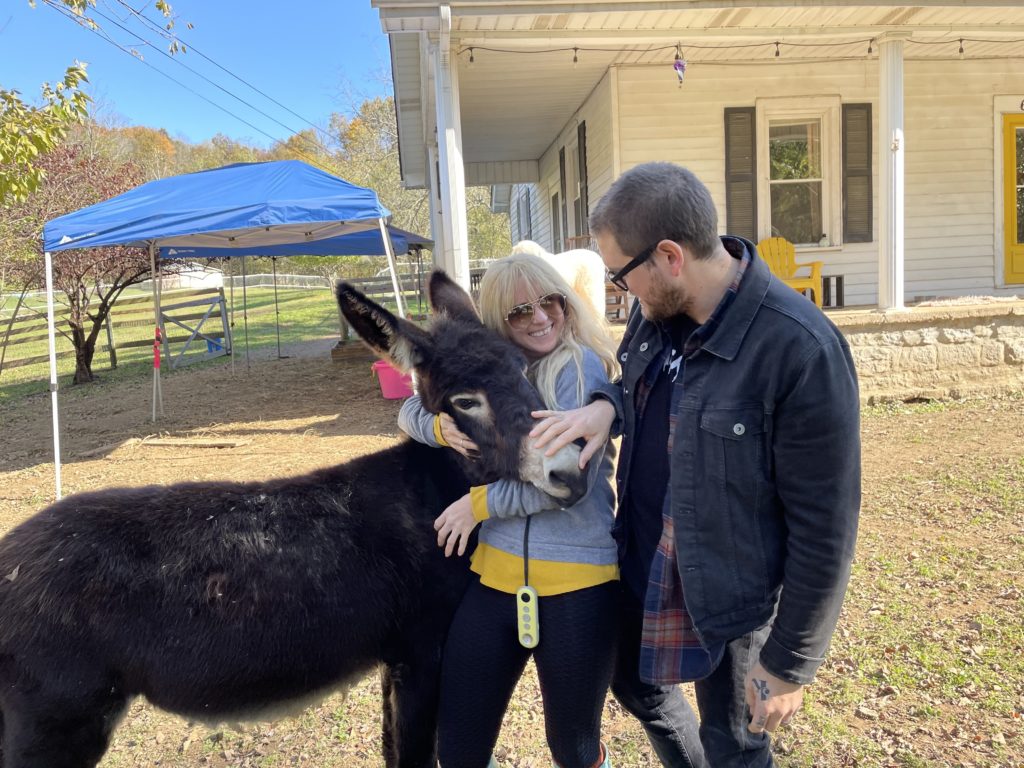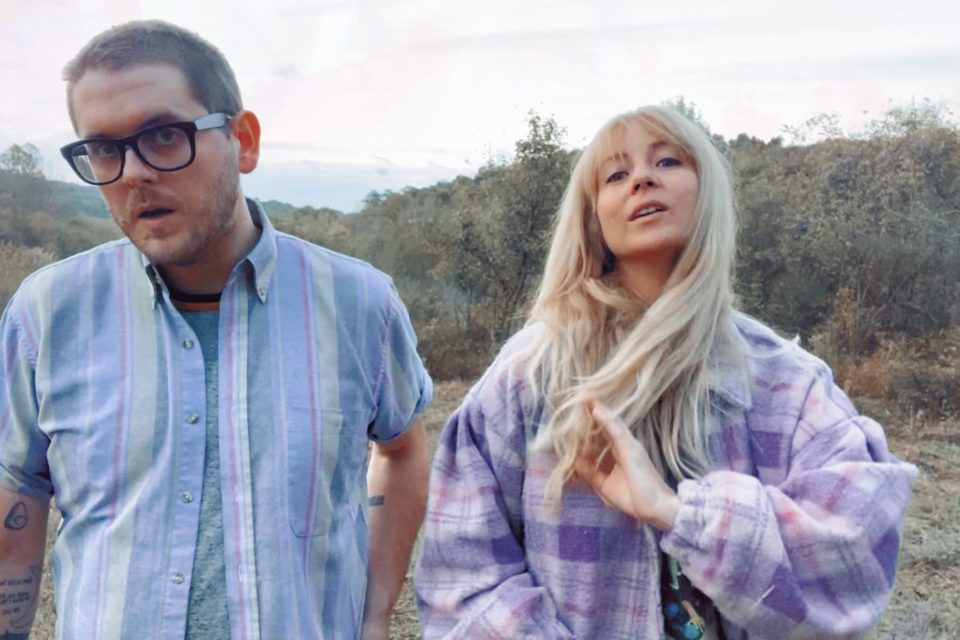What does success look like for an indie band right now? Before the pandemic, WNXP’s Nashville Artist of the Month *repeat repeat had many of the hallmarks: a big management company, a major booking agency, an indie record deal, an album produced by a Black Key. But all that went away when the world shut down. Some of the changes were pandemic related, some not. Now two years, 50 songs and more than a dozen rescue animals later, the husband-and-wife duo of Jared and Kristyn Corder are rebuilding and redefining success at a country home an hour outside of Nashville.
Welcome to Polychrome Ranch
Down a gravel road an hour outside of Nashville, a trio of donkeys mill around a fenced-in front yard while several dogs lazily greet the random vehicle pulling up the drive to meet their musician caretakers. The Corders have been releasing records music under the name *repeat repeat for almost ten years, and for the majority of that time, they lived among indie rock peers in East Nashville. While rampant gentrification has led to the exodus of lots of local musicians recently, the couple didn’t make the move to a rural area because of skyrocketing real estate. They wanted more room for their rescue animals, and more space to explore a new season of music-making.

Life at the “ranch” has come with many adjustments, from having to track down a country vet for donkey castration to swapping commercial studios for living room recording. Jared says that Kristyn has done some of her best singing to date while sitting on the couch with a cat on her lap, including her first ever lead vocal performance in “Wind In My Sail.”
The new studio set up also increased their output. The band has steadily releasing singles since 2020, some of them featuring uninvited guests.
“We have music coming out now where you can hear the birds like our African grey parrot beeping or squeaking,” Jared admits.
“Rarely is it like ‘This is the best take!’ and right in the middle of it something happens,” Kristyn says. “But I’ll tell you something funny about donkeys: they don’t really make noise unless they want something, or they see you. I mean [the animal sounds] are faint, of course, because we mix them way low, but we also just kind of decide, ‘That’s just the sound of our life.’”
That’s also the sound of their interviews these days, with a three-logged dog and a dancing parrot sharing the attention.
Beautiful, Magical, Weird, Awesome
The band’s new manager, Joe Greenwald, describes the couple’s life as “beautiful,” “magical,” “weird,” and “awesome.”
“What they have is really special,” Greenwald says. “And I think they’ve already found success in that realm. I mean they want, and they push, and they drive and they work, but they’re content. Not a lot of people are truly content, and I truly believe in my heart those two are content.”
Greenwald says it was that spirit, and their music, that convinced him to start working with the band during lockdown. At the time, he was hesitant to take on another artist. His company already has an impressive roster, which includes Black Pumas, Japanese Breakfast and many others. Plus it wasn’t like *repeat repeat was on fire. Even the band worried they had peaked right before the pandemic. Their final pre-lockdown concert was opening for Modest Mouse and the Black Keys at Bridgestone Arena. That show was also ten years to the day Jared moved to Nashville.
“So it was like all these highs, and then coming down from it was this immense, weird feeling of melancholy and [wondering] what to do next,” Jared says. “And we felt like we set the bar so high.”
“And it was right around this time [of year] too,” Kristyn says. “So everything was starting to get cold and dead and we’re like, ‘Oh no, are we also cold and dead?’”
The Corders joke about the dramatic shift, but acknowledge the move to the country also revealed something they hadn’t really noticed before: Jared’s seasonal depression. That informed the sound and the subject matter of their new EP Songs for a Nice Drive, a darker, subtler departure from the sunny, distorted power pop that dominated their past recordings.
So, How’s Business?
While the Corders were busy releasing new music, their back catalog got a boost during lockdown when a prominent LGTBQ influencer used their song “Girlfriend” in a video. The resulting increase was nice, but not enough to pay the bills. Like many musicians whose primary source of income – touring – was taken away during lockdown, Jared began exploring other means of making money and discovered a knack for producing other artists, while Kristyn continued her design business.
“I feel like it’s important to mention that, because I don’t want it to ever come across as, ‘Oh yeah, we’re just an indie band and it’s just so easy for us,’ because it’s not easy and we work a lot and we work very hard and I work from the road,” Kristyn says. “I mean, the day we played Bridgestone, I was working from the back of the van probably four hours before that. That’s what it really looks like.”
“For them to make a living as an artist, they have to be on the road,” Greenwald, their manager, explains. “That’s where your revenue is. The component has to be, ‘How do we still do what we do the way we want to do it, but find a way to maximize revenue so we can continue to do this?’”
Greenwald and the band admit it’s a calculation they are still figuring out. They’re looking for a label, but not waiting to release music. They want to tour, but are being careful about timing in a flooded market. It’s daunting, but the Corders are dedicated to reconnecting with audiences on their own terms. After the comedown, the lockdown and a season of self-doubt, Jared says the unraveling reconfigured his expectations and renewed his inspiration: “When I took out the trying to do it on a timeline or anything, and then pushed myself to the point where I thought maybe I should give up, that’s when creativity exploded.”

